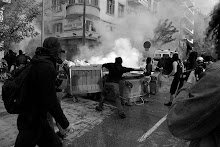Contrary to what is often believed, affinity between comrades does not depend on sympathy or sentiment. To have affinity means to have knowledge of the other, to know how they think on social issues and how they think they can intervene in the social clash. This deepening of knowledge between comrades is an aspect that is often neglected, impeding effective action.
One of the most difficult problems anarchists have had to face throughout their history is what form of organisation to adopt in the struggle.
At the two ends of the spectrum we find on the one hand the individualists who refuse any kind of stable relationship; on the other those who support a permanent organisation which acts on a pro-gramme established at the moment of its constitution.
Both of the forms sketched out here have characteristics that are criticisable from an insurrectional point of view.
In fact, when individualists single out and strike the class enemy they are sometimes far ahead of the most comba tive of the class components of the time, and their action is not understood. On the contrary, those who support the need for a permanent organisation often wait until there is already a considerable num-ber of exploited indicating how and when to strike the class enemy. The former carry out actions that turn out to be too far ahead of the level of the struggle, the latter too far behind.
One of the reasons for this defi-ciency is in our opinion lack of perspective.
Clearly no one has a sure recipe that contains no defects: we can however point out the limitations we. see in cer tain kinds of organisation, and indicate possible alternatives.
One of these is known as "affinity groups".
The term requires an explanation.
Affinity is often confused with sentiment. Although not distinctly separate, the two terms should not be considered synonymous. There could be comrades with whom we consider we have an affinity, but whom we do not find sympathetic and vice versa.
Basically, to have an affinity with a comrade means to know them, to have deepened one's knowledge of them. As that knowledge grows, the affinity can increase to the point of making an action together possible; but it can also diminish to the point of making it practically impossible.
Knowledge of another is an infinite process which can stop at any level according to the circumstances and objectives one wants to reach together. One could therefore have an affinity for doing some things and not others. It becomes obvious that when one speaks of knowledge that does not mean it is necessary to discuss one's personal problems, although these can become important when they interfere with the process of deepening knowledge of one another.
In this sense having knowledge of the other does not necessarily mean hav-ing an intimate relationship. What it is necessary to know is how the comrade thinks concerning the social problems which the class struggle confronts him with, how he thinks he can intervene, what methods he thinks should be used in given situations, etc.
The first step in the deepening of knowledge between comrades is discus-sion. It is preferable to have a clarifying premiss, such as something written, so the various problems can be gone into well.
Once the essentials are clarified the affinity group or groups are practical-ly formed. The deepening of knowledge between comrades continues in relation to their action as a group and the latter's encounter with reality as a whole. While this process is taking place their know-ledge often widens and strong bonds between comrades often emerge. This how-ever is a, consequence of the affinity, not its primal aim.
It often happens that comrades go about things the other way round, beginning some kind of activity and only pro ceeding to the necessary clarifications later, without ever having assessed the level of affinity required to do anything together. Things are left to chance, as though some kind of clarity were automatically to emerge from the group simply by its formation. Of course this does not happen: the group either stag-nates because there is no clear road for it to take, or it follows the tendency of the comrade or comrades who have the clear-est ideas as to what they want to do while others allow themselves to be pulled along, often with little enthusiasm or real engagement.
The affinity group on the other hand finds it has great potential and is immediately addressed towards action, basing itself not on the quantity of its adherents, but on the qualitative strength of a number of individuals working together in a projectuality that they develop together as they go along. From being a specific structure of the anarchist movement and the whole arc of activity that this presents-propaganda, direct action, perhaps producing a paper, work-ing within an informal organisation-it can also look outwards to forming a base nucleus or some other mass structure and thus intervene more effectively in the social clash.
Subscribe to:
Post Comments (Atom)




No comments:
Post a Comment